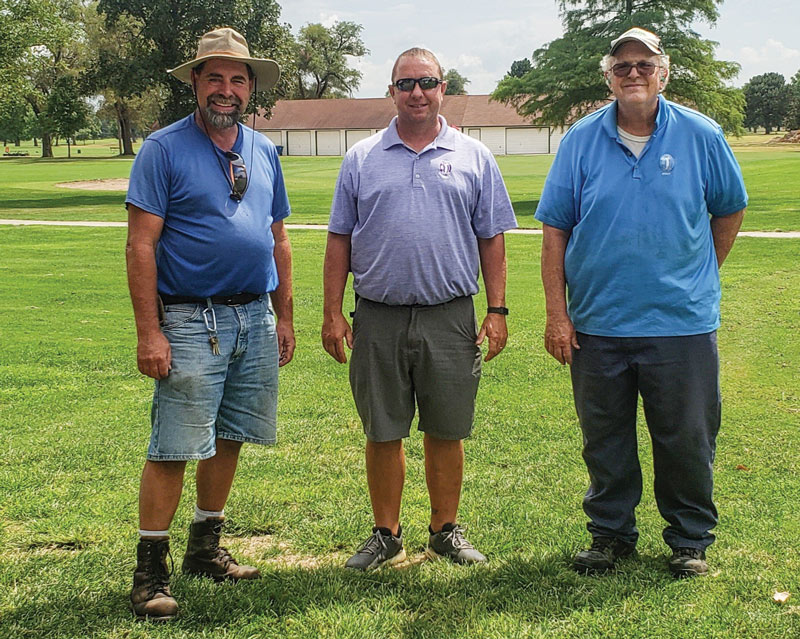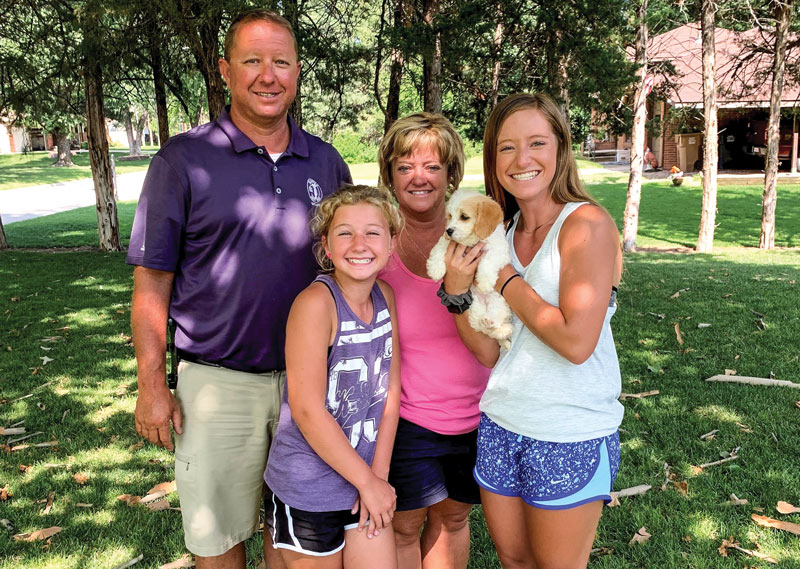
The 10th hole at Carey Park Golf Course in Hutchinson, Kan., where author Matt Miller has been the superintendent since 2002. Photos courtesy of Matt Miller
Many things in this world are beyond our control. We can’t control the way others perceive us. We can’t control whether someone else is better than we are at a particular job or activity. We can’t control the fact that we may fail from time to time when trying to better ourselves. We can’t control that change is inevitable.
However, there are two things we always have full control over: effort and attitude.
I have tried to instill in my children since they were young that I expect nothing more from them than effort and attitude. That was mostly directed toward sports, but in all of their endeavors, win or lose, I expect to see them give 100% and remain positive, even in difficult situations. This is not always easy, but it will help make bigger obstacles later in life easier to deal with.
This is a philosophy I preached but did not fully understand until about 15 years ago, and at that point, I was well into my career.
I began my career (before I knew it would develop into that) working at privately owned public golf facilities. I became accustomed to the way those operations worked. I then spent some time after college as assistant or superintendent at private and semiprivate clubs.
My outlook shifted with my next career move: In 2002, I took a superintendent job at a municipal golf course.
A change of scenery
I had no idea how much things would change. I could not believe the amount of paperwork that was required, the number of meetings I would need to attend, or that it could take over two weeks to hire a summer employee. I expected changes, but was astounded by the number.
A couple of years into the position, I began to seriously doubt that I was at the proper facility. I was not happy from the time I left for work until well after I got home each day. This was a horrible feeling, because I felt I was meant to be a golf course superintendent. I was still giving full effort daily because that is the way I was raised, but these feelings continued for about a year. I started looking for other job opportunities, but wasn’t really interested in leaving. I was very confused, to say the least.
I was never truly living in misery; I simply was not happy at work and was always focusing on the negative aspects of municipal government. Little things bothered me more than they should have. I felt burdened by the bureaucracy that went along with the management of a municipal golf course. There were so many policies to follow — for purchasing, for telephone and company vehicle usage, and regulations related to employees who are part of a bargaining unit.
I don’t think I was generally unhappy or depressed; I just had a bad attitude toward my job. I didn’t mind the long hours or hard work. After all, I had worked on golf courses for several years, so I knew what I’d signed up for as a golf course superintendent. I simply had a difficult time adjusting to the difference between the private and public sectors. I always received great evaluations from my supervisors. I don’t think they knew how I really felt. I am not one to hold back my opinions, and I told them on occasion how I felt about certain practices or policies, but I didn’t really talk about the big picture.
I have always understood that I am not going to change the way government operates, and I figured I was going to be the one who needed to adapt. I still offered suggestions or expressed concern with practices that didn’t make sense, and, occasionally, I had a good idea or two.
Then one day, everything changed.
Self-discovery
After several months of general professional unhappiness, I decided to take a look at myself and evaluate where I was in my career and what I really wanted.
- I thought about my golf course: It was a good course, with a lot of tradition.
- I had a very experienced staff; I was still the new guy.
- I had started to build the equipment fleet — even more than previous superintendents had.
- We had a master plan done, and there could be projects coming soon, including irrigation upgrades.
- My boss was a good guy and easy to work for.
- Finally, I had a great golf professional who would help in any way and always had my back.
This reevaluation made me realize there were a lot of good things going on here. Did I really want to let my displeasure with paperwork and meetings take away from that?
I decided at that moment that I would begin to focus on the positives in my life rather than the negatives.
The power of positive thought
There was no counseling or intervention. There was no discussion with my family. I think I hid my feelings well. I merely decided it was time for me to change the way I looked at things, especially work.
The difference was immediate.
I was suddenly happy to go to work and eager to take on new challenges. From that day on, there has been a different atmosphere at the shop. Apparently, my negative attitude was wearing on the rest of the staff. I didn’t realize it or notice it at the time, but there was no way they were completely happy with the work environment when I displayed a negative attitude. I know I made comments about how I had to go to another meeting or made other derogatory remarks about the system. There has been a marked improvement in morale and progress since I made my attitude adjustment.

Author Matt Miller (center) with Carey Park Golf Course irrigation technician Korey Wondra (left) and assistant superintendent Keith Cooley.
Amazingly, the more I focused on the positive aspects, the more we accomplished. It became easier to motivate the crew to give their all each day as the overall attitude improved. We have developed a team atmosphere, focused on how we can best care for the facility and take care of our customers.
Editor’s note: Rapport with employees sets the stage for optimal operation of the golf course, and prioritizing interpersonal connections can also help superintendents navigate a challenging business landscape. Learn more in Leadership and the human connection in the workplace.
Life is good — or at least better
Studies show that employee dissatisfaction or unhappiness at work factors into the decision to leave a job. The turnover within our organization has been very high. I just started working with the third city manager since I began working here in 2002. I have had three direct supervisors in the parks and facilities department. There have been three human resources directors, five finance directors, three public works directors and numerous middle management personnel changes.
The transitions required by the changes in management have gone smoothly for me since my attitude adjustment.
I am one of the longest-tenured supervisors within the city. My three full-time employees have all been here longer than I have. Given the turnover rates we see in other departments/divisions, we must be doing something right at the golf course. I am sure we would not have been able to retain such a dedicated staff if I had not changed my attitude.
We have fully renovated nine holes, including the irrigation, and upgraded the pump station, and we continue to build a fleet of equipment that would be envied by many. We continue to move in the right direction to be successful in selling our product to city administration. There have been many bumps in the road, as there will continue to be, but the right attitude has definitely helped us persevere through the dark times.
The attitude change was also noticeable at home, even though I had previously tried not to bring home any unhappiness. Suddenly, I came home a happier person. My wife could tell the difference in my attitude — not just about work, but regarding everything. She would make comments occasionally about my being in a better mood. I became more pleasant to be around — I was no longer complaining about how much different this job was than my previous jobs.
The change in attitude simply made life seem better — for me and those around me.
Moving goal posts
I have always been one to encourage others to continually evaluate their goals, because these can change from time to time, and we might not even realize it.
About 10 years into my current position, the job opportunity I had worked my whole career for became available. I applied for the position and was offered the job. I had to genuinely evaluate with myself and my family whether my career goals were still what they had been for the previous decade. After making lists of positives and negatives for my current position as well as the offered position, we decided I was where I needed and wanted to be.

The Millers (from left): Matt; daughter Macy; wife, Lori; and daughter Haley, who is holding Hallie.
I have always made a point, when guest-speaking to a class at Kansas State University or at an assistant superintendent meeting, to tell attendees they should be evaluating and modifying their career goals constantly. Up to that point, I’d had one objective and was only looking for the best way to get there. It was time to take my own advice and think about where I could potentially best finish my golf course career.
Navigating COVID-19 concerns
This year, we’ve all been forced to deal with the coronavirus pandemic. It has affected all of us and our golf courses to some degree. I feel my positive attitude has helped me handle this unfortunate situation well.
I have worked constantly with my golf professional and my colleagues in the area to put together a plan to help keep our course and many other courses around the state open for safe play. We were ahead of many places in cutting off access to the clubhouse areas and restricting cart use. We were able to make accommodations for “touchless” golf by removing many course accessories and modifying flagsticks.
We were always looking forward and not dwelling on what we were not able to do. Our facility will suffer greatly this year financially because of the lack of pro shop and concession sales for such a long period, but we have been able to keep the golf course operable for our customers, as well as for our employees.
As a sales-tax-funded, municipal facility, we have been handed budget constraints that will be a huge obstacle to overcome this year. We have only been allowed to hire about a third of our usual seasonal or part-time staff. That had been easier to deal with, given that our season was just getting started when all of this happened. Now that leagues and tournaments are back in the mix and things like ball washers, bunker rakes and water jugs have returned to the course, the adjustment has been more difficult. Our whole golf course team — including the clubhouse and maintenance staffs — has remained positive while being cautious. I feel my leadership has been a good influence during this time, and my positive attitude has carried through the staff.
Editor’s note: A South Dakota superintendent shares what he has learned within the profession — including lessons in leadership, self-awareness, managing others and more — in Wisdom for the superintendent journey.
I was fortunate, as president of our local GCSAA chapter, to get to work with many other local and national golf organizations, including the PGA, GCSAA, Central Golf Links and other GCSAA chapters, to help put together and disseminate information to other courses in our state to help them at least remain open for golf maintenance. Many were able to remain open or reopen for play through the collaborative efforts of these organizations. We were not able to keep every course open, but we were able to help many. I felt proud that members were comfortable reaching out to me to ask for a letter to a local leader or to share guidelines set forth by this group and my facility in particular. Some of the best people you will ever find work in the golf industry in Kansas.
Finding focus
Anyone who knows me knows that if I am going to do something, I am going to be all-in. I would never not do my job because I did not agree with decisions made by management. I will still try my best to make the most of every situation.
I have served on the board of our local GCSAA chapter for many years. I have always been involved with the other board members, as well as chapter members. I have been a part of several changes that have been made to our association. I am always one to give my opinion. Sometimes others agree with me and sometimes they don’t, but we have a great membership, and I have worked with some intelligent board members. Different opinions are what help make effective changes. The great people in our organization make it easy to stay motivated and be positive.

Carey Park’s No. 7 fairway. The 18-hole course opened in the 1930s.
I still have bad days and tough times like everyone else. If a difficult time doesn’t pass right away, I do have to remind myself that the situation is only temporary, and things will get better. It all goes back to that philosophy about effort and attitude I tried to instill in my children. It is fairly easy to work hard. It is much more difficult to keep a positive attitude through tough times.
Thanks to my attitude adjustment, I now strive to change what I can and accept what I can’t. I and those around me are noticeably better for it.
Just like that
After wallowing in general professional unhappiness for a couple of years, I finally decided enough was enough.
Three years after moving from the private to the public side of golf course maintenance, I finally came to the realization that the system wasn’t going to change to suit me. Literally, one day I decided to make an attitude change.
I know that won’t work for everyone, but it did for me. Other times I’ve needed to make a significant change, I’ve had input from others — sometimes not what I thought or wanted to hear, but necessary input nonetheless. Luckily, I was smart enough to listen to those helping me, and I think that has helped me become more self-aware and able to realize when things aren’t as they should be.
I would suggest that others take advice from people trying to help them. Family and friends are usually looking out for your best interest and genuinely want to help you get through difficult times. If they don’t take you seriously, find new friends. Listen to them, even if they are telling you things you don’t believe or don’t want to hear.
When it seems like everyone else is the problem, it usually isn’t everyone else.
Matt Miller is the GCSAA Class A superintendent at Carey Park Golf Course in Hutchinson, Kan., and a 26-year member of the association. He is a past president of both the Kansas GCSA and the Kansas Turfgrass Foundation.